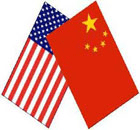Top Biz News
Exclusive online branding of footwear, clothing to expand
By Chen Limin (China Daily)
Updated: 2010-01-06 08:04
 |
Large Medium Small |
Shopping on the Web recently, shoe aficionado Cai Xiaohua was elated to discover a footwear brand, available only online, that was both cheap and similar in style to her favorite brands.
Fortunately for Cai, she and many other online shoppers will be seeing more of the same in the future as Chinese clothing and shoe companies seek to peddle unique products exclusively on the Internet.
Brand-name companies, including China's biggest sporting goods producer Li-Ning and the men's garment maker Septwolves, are planning to launch Internet-only products in 2010 and 2011 respectively to cash in on China's booming e-market.
"We will focus on different types of Internet shoppers and try to provide goods that can satisfy various tastes," said Jerry Hu, Septwolves e-business manager.
This business model enables manufacturers to effectively receive feedback from customers and produce products accordingly, said Cao Fanghua, an e-business specialist.
Online shopping volume in China is estimated to have reached 247.4 billion yuan last year, up 93 percent from 2008, according to domestic research firm iResearch.
Many firms, who have already established themselves in brick-and-mortar stores, are stepping into the e-business market to take a chunk of a growing pie.
"In our industry, in the 21st century, you will do e-business or no business," said Hu.
Domestically, Li-Ning and Septwolves were not the first to come up with the idea of selling products exclusively on the Internet. Belle International, the largest retailer of women's shoes on the mainland, established its online brand Innet two months ago. The brand now accounts for half of Belle International's products online.
"Online sales of our corporation were around 50 million yuan in 2009, accounting for less than 1 percent of total sales, but we are confident we will reach 200 million yuan this year," said Hu Chenrong, director of e-business operations at Belle International.
"I was once showered by complaints from owners of our offline stores, saying that low discounts offered online made doing business difficult," said Hu, referring to discounts from unauthorized C2C sellers who get supplies from the company's offline agents and factory leftovers.
So Septwolves is stepping up its effort to prevent its agents from supplying goods to C2C sellers. From this year on the company will code to its products to register them by the region they are sold in. This way, the company can trace the specific agent responsible for sales in a certain region.
Some companies, such as Li-Ning, are trying to solve the pricing problem by bringing competitive C2C sellers into their authorized management and pricing system. The company offers them supplies, training, and other product-related services and the C2C stores have to obey the company's management, pricing, and discount policies.













